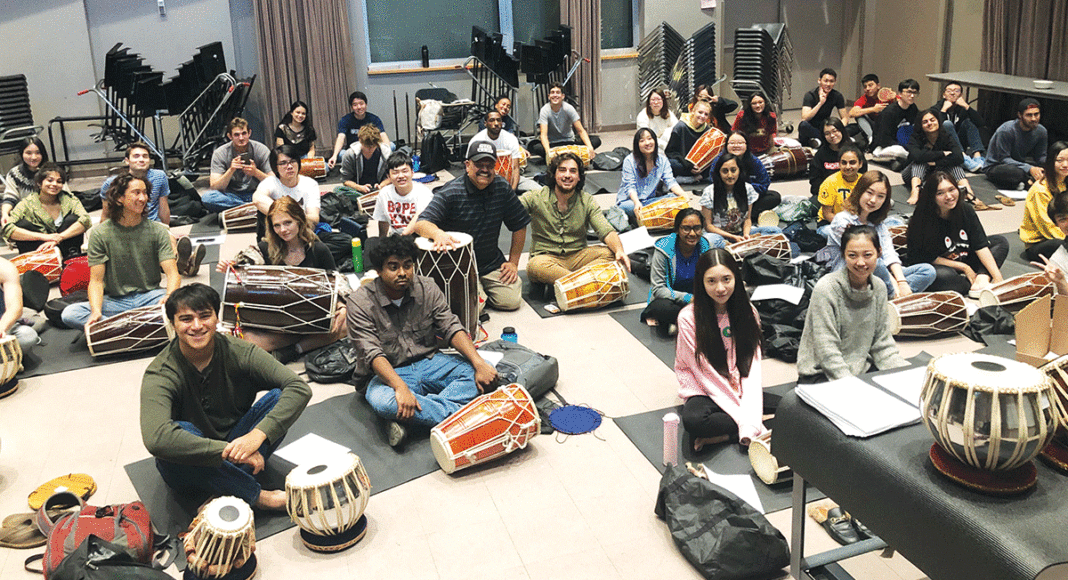At first, it sounds like one of those weirdly random food combinations that preteens without adult supervision experiment with at home (bananas and taco sauce?). Last summer, 1980s hitmakers Violent Femmes (“Blister in the Sun”) shared a stage with Indian-American sitar master Ashwin Batish.
Turns out, this pairing was anything but random. The punk-pop trio from Wisconsin and the sitarist from Santa Cruz have been occasionally performing together for decades. The unlikely collaboration is a vestige of one of those largely forgotten and bizarrely inspired impromptu jams that pop up throughout modern music history.
In 1991, at the New Jazz Festival in Moers, Germany, madly adventurous avant-garde guitarist Eugene Chadbourne convened a supergroup featuring jazz banjo giant Tony Trischka and Jimmy Carl Black, famed drummer for Frank Zappa’s Mothers of Invention. Among the many others recruited for the band to be known as “The Daffy Duck Dozen” was Violent Femmes bass player Brian Ritchie and sitarist Batish. The two men enjoyed improvising together on stage and struck up a friendship.
Jamming with the Violent Femmes whenever the band comes to the Bay Area isn’t merely incidental for the 67-year-old Batish. It is at the core of the man’s nearly five-decade career bridging East and West with a specific mission to push Indian classical music further down to the path to evolution.
Few musicians are more comfortable straddling cultural traditions than Batish, who is both a lifelong student of the complexities of the Indian raga system of music, and a free-wheeling maverick merrily looking for collaboration and influence in Western styles wherever he can find them.
Last January, Batish was given an opportunity to complete a circle when he was invited to teach at UCSC, which was what brought his family to the U.S. to begin with almost 50 years ago. He has been teaching a course in Indian percussion in classes that contain up to 50 general-ed students. The tabla is a big focus, but the class features several other Indian percussive instruments, including the dholak, the mridagam and manjeera. “I tell my students ‘select the thing that you like, and next week, we’re going to switch.’”
On Nov. 19, many of Batish’s UCSC students will come together for a free concert at UCSC’s Music Recital Hall. And in March 2019, at the Kuumbwa Jazz Center, Batish himself and his band—which often includes several family members—will again showcase his adventurous musical style that has led him to be comfortably both a traditionalist and a maverick—in his case, a contradiction contained in the label “Indian-American.”
Batish’s son Keshav Batish is also now a UCSC student and an accomplished drummer in his own right. He has been working as his father’s teaching assistant (“Keshav has been taking my class since he was born,” Ashwin joked). His daughter Mohini, who is also a musician, has just graduated high school and is on her way to UCSC as well.
Batish likes to joke that he was born in Santa Cruz; and he’s not lying—the punch line is that he’s referring to a district, often spelled “Santacruz,” in Mumbai (now the official name of the city called Bombay when Batish was born). When S.D. Batish arrived in Santa Cruz, no one expected him to stay there for decades, least of all his son.
“Once you’re here, there’s just some kind of vibe that you really don’t want to move from here. The thing about this place. I can be myself over here,” he says. “I can do whatever I want. That’s a very important thing.”
The Eurasian Ensemble, the Mariachi Ensemble and the Indian Music & Percussion Ensemble will perform Monday, Nov. 19, at the Music Recital Hall at UC Santa Cruz beginning at 7:30 p.m. Free. More information at facebook.com/sitarpower.














